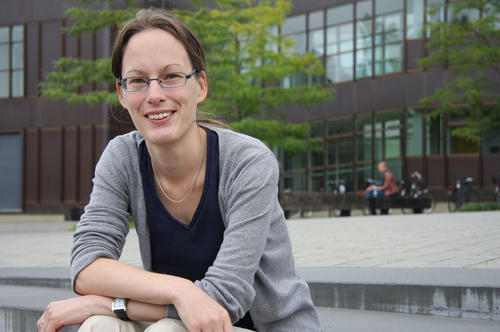Enemy and Helper
Alexander von Humboldt fellow Nadine Rossol is researching the educational role of the police in Germany from 1920 to 1950 at Freie Universität.
Nov 23, 2011
Nadine Rossol, Alexander von Humboldt Fellow at Freie Universität Berlin.
Image Credit: Melanie Hansen
The Cologne police during the Nazi era – Nadine Rossol, then a student of history, greeted the announcement of the topic of her internship at the NS-Dokumentationszentrum Köln (Museum of History of National Socialism in Cologne) with limited enthusiasm at first. “I really would have preferred to work on the theatre during the Nazi era,” Rossol says. But then she became captivated by the history of the police – a fascination that has gripped her to this day, in her work as a researcher. Since August, Rossol has been an Alexander von Humboldt fellow at the Friedrich Meinecke Institute at Freie Universität.
Her topic for the next twelve months: the educational role of the police in the Weimar Republic, during the Nazi era, in the early days of the Federal Republic, and in the former East Germany. She plans to study the methods used by the police in all these different political systems to have an educational impact on the populace.
During the Third Reich, for instance, police officers collected donations for Nazi charities – which explicitly reserved their aid for “Aryan” residents, as their Jewish fellow citizens were left empty-handed. “By taking these kinds of actions, the police were literally taking sides. By doing so, they showed the populace who the supposed troublemakers within society were,” Rossol says.
After her dissertation, working within the scope of the Alexander von Humboldt fellowship is Rossol’s second major research project. She is especially pleased to be able to pursue her plans at Freie Universität: In her dissertation, which dealt with the topic of “Representations of the State in the Weimar Republic,” Rossol discussed various figures, including National Art Commissioner Edwin Redslob, who later became a co-founder of both the Tagesspiegel newspaper and Freie Universität. “It is nice to do research in Redslob’s former domain,” the 33-year-old Rossol says. “I’m also happy to be back in Germany.”
Studying with Royal Company
That’s because Rossol’s previous academic work has all been abroad: After finishing secondary school in Germany, she moved to Scotland. At the University of St Andrews, she studied history and Italian – and she did so with royal company.
During her final year, Britain’s Prince William started his own studies at the time-honored institution. Rossol never actually saw her famous former fellow student, however – which is amazing in itself, in a small town like St Andrews. “The ways we spent our free time must have just been too different,” says Rossol, who finished her studies in St Andrews and went on to a doctoral program at the University of Limerick, in Ireland.
First Scotland, then Ireland – and for a year now, England as well. Rossol now works as a lecturer in modern European history in the Department of History at the University of Essex. Her courses on the Third Reich, she says, always draw a crowd: “The English are still highly interested in Nazism,” Rossol says.
But seminars on police history are also well received by students. When Rossol speaks about criminality in major cities in the 19th century, for instance, or about how the British police force is organized by comparison to those of other European countries, seminar attendees listen raptly. And maybe her students will soon be just as hooked on police history as Rossol herself.
Further Information
Dr. Nadine Rossol (University of Essex), Friedrich-Meinecke-Institut, Koserstr. 20, 14195 Berlin, E-Mail: nrossol@essex.ac.uk

